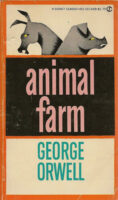Tyranny from Good Intensions
Guest Post by Claudia Gollini
Animal Farm by George Orwell was first published in 1945 and will be celebrating its seventieth birthday next year.
One of Orwell’s finest works, it is a political fable based on the events of Russia’s Bolshevik revolution and the betrayal of the cause by Joseph Stalin.
Parents need to know that Animal Farm is a biting satire of totalitarianism, written in the wake of World War II and published amid the rise of Soviet Russia. Although it tells a fairly simple story of barnyard animals trying to manage themselves after rebelling against their masters, the novel demonstrates how easily good intentions can be subverted into tyranny.
The fable is alive with brilliant touches. At first the victorious pigs write out a set of revolutionary rules, the seventh and most important is of which is “All animals are equal.” It was a brilliant idea to have the clever pigs simplify this for the dimmer animals (the sheep, hens and ducks) into the motto “Four legs good, two legs bad.” But it was a real stroke of genius for Orwell to later have the pigs amending these rules, most notoriously amending rule seven to become “All animals are equal—but some are more equal than others.“ This says something so profound about human beings and our laws and rules that it can be applied anywhere where laws are corrupted and distorted by the powerful.
The book seems relatively simple on the first read but there are several layers of complexity to represent the Soviet government. The novel contains a fair amount of satire and humor, which personally is one of the main reasons why I recommend reading it.
Animal Farm by George Orwell. 1945.
Reviewer bio: Claudia Gollini is a makeup artist, fashion/beauty blogger and journalist, editor and writer, and body painter of events and TV show (Make-up Deborah-Gucci and Castrocaro TV talent show, body painter to Art gallery ‘Spazio l’altrove’ and TV show Sky 869 Village festival and another fairs & exhibition on Italy).





